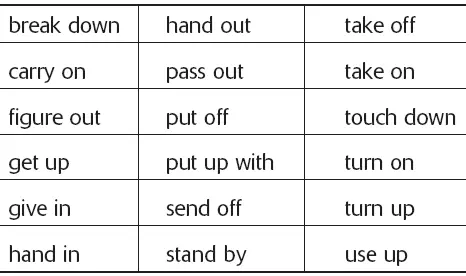Phrasal Verbs with Sentences
Many English verbs require more than one word to express their meanings. These are called phrasal verbs. Compare the single-word verbs with the phrasal verbs in these sentences.
- She put her hat on the table.
- She put on her hat and her coat.
- The sunflower turned toward the light.
- I turned off the light when I left the room.
Usually the word attached to a phrasal verb looks like a preposition, such as out, in, off, up, or on. However, when these words are essential parts of a phrasal verb, they no longer function as prepositions and are instead called particles.
Phrasal verbs are extremely common in English. The following are a few familiar examples:

Like single-word verbs, phrasal verbs can be transitive or intransitive, depending on their meaning. For example:
- Transitive: Take off those wet clothes before you catch cold. (remove)
- Intransitive: I am going to take off after the meeting is over. (leave)
- Intransitive: The plane finally took off after the wings were de-iced. (took flight)
Phrasal verbs are either separable or inseparable. If a phrasal verb is separable, its direct object can come between the verb and the particle.
- Correct: She put on her coat.
- Correct: She put her coat
- Correct: I cannot figure out this problem.
- Correct: I cannot figure this problem
Inseparable phrasal verbs must stay together.
- Correct: She could not deal with the situation.
- Incorrect: She could not deal the situation
- Correct: I need to read up on modern philosophy.
- Incorrect: I need to read up modern philosophy
Some grammarians would say that only separable verbs are true phrasal verbs. They would call inseparable phrasal verbs prepositional verbs.
The Particle at the End of the Sentence
A common English grammar rule says that sentences cannot end with a preposition. This rule was derived from languages like Latin and French, in which it is grammatically impossible to put a preposition at the end of a sentence. Unfortunately, the rule is nonsensical when applied to English, and nowhere is this more evident than with phrasal verbs. The purists insist that it must be split if it appears at the end of a sentence.
Phrasal Verbs with Sentences
Example Problems
Is this phrasal verb separable or inseparable?
- Take back
Answer: Separable. Try putting the verb into a sentence: I will take back my book. I will take my book back.
- Look up
Answer: Separable. Look up the definition. Look the definition up.
- Come across
Answer: Inseparable. I came across the answer. But not: I came the answer across.
Underline the phrasal verb(s) in each sentence. Correct any that are wrongly separated.
- We will take up the project again after the holiday break.
Answer: We will take up the project again after the holiday break. (The phrasal verb take up means resume in this context, and it is separable: Take it up.)
- You cannot carry this way on and expect to hand your paper in on time.
Answer: You cannot carry on this way and expect to hand your paper in on time. (Carry on is not separable; hand in is separable.
- Remember to turn off the lights when you leave the room.
Answer: Remember to turn off the lights when you leave the room. (Turn off is separable: Turn them off.)
- He threw up his hands in disgust.
Answer: He threw up his hands in disgust. (Threw up in this context is separable: Threw them up.)
- What has become my glasses of? I cannot do them without.
Answer: What has become of my glasses? I cannot do without them. (Both become of and do without are inseparable.)
- We need to talk over this new proposal.
Answer: We need to talk over this new proposal. (Talk over is separable: Talk it over.)
- Given time, we can work out a solution.
Answer: Given time, we can work out a solution. (Work out is separable: Work it out.)
- Ali asked if we could come over to his office and look over his accounts.
Answer: Ali asked if we could come over to his office and look over his accounts. (Come over is inseparable, but look over is separable.)
- Turn the volume up. I cannot hear what that guy is going on about.
Answer: Turn the volume up. I cannot hear what that guy is going on about. (Turn up is separable; going on about is inseparable.)
- Put down that bag. Pick this box up.
Answer: Put down that bag. Pick this box up. (Both put down and pick up are separable.)
Thanks for reading about “phrasal verbs with sentences”.